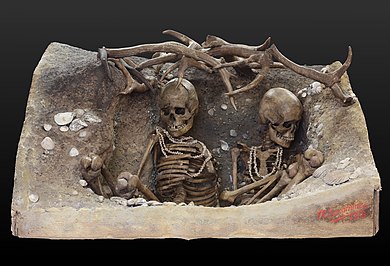
Courtesy of wikipedia.org
“Suicide,” someone murmured after reading the announcement that a woman had died at the retirement center. “She was estranged from her family,” said another who stood beside the first speaker. Her remark rang true because the death notice asked that no condolences be left for the family.
A shiver of melancholy ran through me as I read it. Being the last of my tribe, I realized that upon my death, no one would need consoling.
Headstones proliferate like autumn leaves in a graveyard but no matter how touching their inscription, the words are unreliable tributes to a life. A generation passes and few remember. After eons come and go, archeologists may take an interest in a burial mound. And, if they find a necklace or smooth stone left beside someone they have disentombed, they are elated rather than grieved because the found object has been shorn of its memories.
Sometimes two bodies share the same grave, a discovery that raises a question. Are these bones those of lovers? Or does a mother lie eternally with her stillborn child? Their deathly embrace tells a story but who remembers?
The desire to escape oblivion is potent. A hundred thousand years before homo sapiens walked the earth, the prehuman Homo Naledis buried their dead with mementos before carving the histories of these loved ones on cave walls.
Again, researchers rejoice because while the personal memory of these beings is erased, something about the hominin culture remains. Patriarchy has a long presence in the affairs of humanoids, for example. DNA studies of ancient sites suggest that females left their home community to join another– suggesting the probability that they followed their male companion to his home tribe.
Memory is a frail weapon with which to hold back the dark. Technology may come to serve us better. In an earlier blog, I wrote that one day we might download our stories into avatars but that would be a pale version of immortality. A combination of technology and biology is also possible, like current efforts to merge Artificial Intelligence (AI) with brain cells. Will the result make machines smarter? Or will humans become superhuman? Either way, will the merger help us conquer death? We must wait to see.
Some among us seek a less ambitious goal. With diet and medicinal cocktails, they hope to reverse the aging process. Regimens like theirs are spartan, often eliminating meat and sugar. To obtain a longer life, will humans forgo their hamburgers with cokes? Again, we must wait to see.
Beyond tinkering with the human lifespan lies an existential question. Having plundered our planet’s resources to the point of self-extinction, do we have enough time to save our species with discoveries and technological advances? Or, is our destiny to grovel in the dust for a sip of water?
To be or not to be IS the overwhelming question. The woman who committed suicide at my retirement center made her choice freely. Others have done the same because without love and respect what is life?
Germaine Greer, a woman near my years, ponders a related question: how to age with dignity? Once a professor, feminist, and author of numerous books, The Female Eunuch most famous among them, and a person brilliant enough to disabuse William F. Buckley of his misconceptions about women’s liberation at 84 faces a growing infirmity. To maintain her independence, she moved into a retirement center. The solution proved to be unworkable.
There, she suffered endless days of Bingo and bus outings to places that looked the same. This she endured for ten months, being subjected all the while to abuse from fellow residents who repeatedly told her to “shut up.” The treatment must have come as a surprise to a person accustomed to being paid to speak.
Fortunately, a brother took pity on Germaine and built a studio in his home where she could live in the bosom of her family but in solitude. I say, “Happy is a woman with a compassionate brother.” Happy is the individual who dies loved.
Science and technology have the power to lengthen life spans but human attitudes toward aging are slow to change. In the United States, prejudice against the elderly is the last reservoir of disdain that people feel free to express, as if growing old were a personal failure. Teenagers may be forgiven for imagining themselves to be immortal, but tyrants who feel the same are fools.
Is it the light that falls from the swords of their armies that blind these dictators? Are they unable to see that like any pauper, they serve no higher purpose than to satisfy the appetites of worms? How greater their history might have been had they considered our common destiny and devoted themselves to acts of kindness. In death do triumph and failure humbly meet. (The Victory City by Salman Rushdie, Thorndike Press, 2023, pg. 531.)
